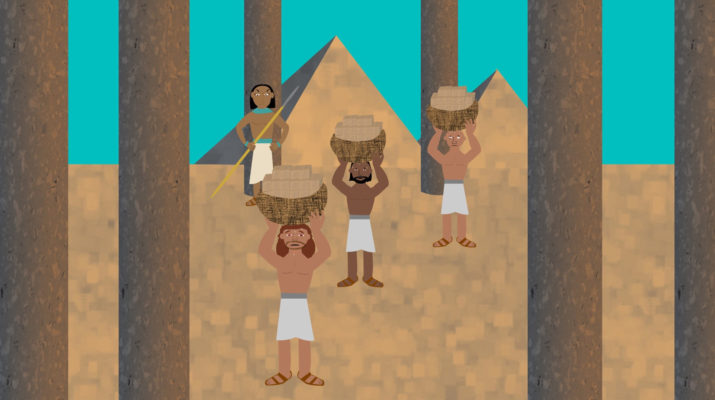Exodus 5
BibleHub
1 AfterwardI MosesII and AaronIII wentIV to PharaohV
Notes on verse 1a
I “afterward” = achar. From achar (to remain behind, linger, continue, be behind, or delay; can also imply procrastination). This is after or the last part, following.
II “Moses” = Mosheh. From mashah (to pull out in a literal or figurative sense, to draw out) OR from Egyptian mes or mesu (child, son i.e. child of…). This is Moses – the one drawn out from the water, which is to say, rescued. If derived from the Egyptian, his name would share a root with Rameses and Thutmose.
III “Aaron” = Aharon. Derivation uncertain. May mean “bearer of martyrs” OR be related to Ancient Egyptian ꜥḥꜣ rw (warrior lion) OR elevated, exalted, high mountain. This is Aaron. See https://en.wiktionary.org/wiki/Aaron
IV “went” = bo. This is to enter, come in, advance, fulfill, bring offerings, enter to worship, attack. It can also have a sexual connotation.
V “Pharaoh” = Paroh. From Egyptian pr (palace, pharaoh; literally house + great). This is Pharaoh, a title for Egyptian kings. See https://en.wiktionary.org/wiki/pharaoh
and said, “Thus says the Lord,VI the GodVII of Israel,VIII
Notes on verse 1b
VI “Lord” = YHVH. From havah (to be, become) or hayah (to come to pass, become, be). This is the name of the God of Israel, the self-existent and eternal one, the tetragrammaton. This pronunciation has been lost to time so “Lord” is generally used in its place.
VII “God” = Elohim.
VIII “Israel” = Yisrael. Related to “God” in v1. From sarah (to persist, exert oneself, contend, persevere, wrestle, prevail) + el (see note VII above). This is Israel, meaning God strives or one who strives with God; new name for Jacob and for his offspring. This refers to the people and to the land.
‘Let my peopleIX go,X so that they may celebrate a festivalXI to me in the wilderness.’”XII
Notes on verse 1c
IX “people” = am. From amam (to darken, hide, associate; creating shadows by huddling together). This is people or nation. It can be used specifically for a tribe, collectively of troops or armies, or figuratively to refer to a flock of animals.
X “let…go” = shalach. This is to send out, away, send for, forsake. It can also mean to divorce or set a slave free.
XI “celebrate a festival” = chagag. 16x in OT. This is feast, celebrating a festival, making a pilgrimage. Properly, it means going in a circle or marching in sacred procession. It implies giddiness and dancing. It can also mean reeling to and fro.
XII “wilderness” = midbar. From dabar (to speak, command, declare). This is mouth or speech. It can also be desert or wilderness. Additionally, it can be used for a pasture to which one drives cattle.
2 But Pharaoh said, “Who is the Lord, that I should heedXIII himXIV and let Israel go? I do not knowXV the Lord, and I will not let Israel go.”
Notes on verse 2
XIII “heed” = shama. This is to hear, call, consent, or consider. It implies listening intelligently, giving attention, and, because of these two factors, obedience and action are often implied.
XIV “him” = qol. Literally, “his voice.” This is a sound, used often for human voices. Also used when God speaks or angels, animals or instruments. It can be a cry or a noise, thunder or earthquakes and so on.
XV “know” = yada. This is to know, acknowledge, advise, answer, be aware, be acquainted with. Properly, this is to figure something out by seeing. It includes ideas of observation, recognition, and care about something. It can be used causatively for instruction, designation, and punishment.
3 Then they said, “The God of the HebrewsXVI has revealedXVII himself to us; let us goXVIII, XIX
Notes on verse 3a
XVI “Hebrews” = Ibri. From Eber (the region beyond; Eber, the name of several Israelites including a descendant of Shem); from abar (to pass over, pass through, or pass by; cross over or to alienate; used for transitions). This is Hebrew, perhaps meaning a descendant of Eber.
XVII “revealed” = qara. This is to meet, befall, happen upon. It can be to encounter by chance or for aggression.
XVIII “let…go” = halak. This is go, come, walk. It is walk literally and figuratively and includes people and animals. It can be used figuratively for one’s moral life – how we walk according to God’s way or against it. It can also refer to the walk of life as in the course one’s life takes, the choices we make, etc.
XIX {untranslated} = na. This particle is used for requests or for urging. It can be we pray, now, I ask you, oh. This is the same “na” in “hosanna.”
a threeXX days’XXI journeyXXII into the wilderness to sacrificeXXIII to the Lord our God, orXXIV he will fallXXV upon us with pestilenceXXVI or sword.”XXVII
Notes on verse 3b
XX “three” = shalosh. This is three, fork, three times.
XXI “days’” = yom. Root may mean being hot. This is the day in a literal or figurative sense. It can also mean birth, age, daylight, continually or other references to time.
XXII “journey” = derek. From darak (to tread, march, to walk. Can also mean affixing a string to a box since one needs to step on it to bend it in the process; so also an archer). This is a road as a thing that is walked on. Can be used figuratively for the path that one’s life takes or how one chooses to live one’s life.
XXIII “sacrifice” = zabach. This is slaughtering an animal, generally for the purpose of sacrifice. It can mean kill or offer.
XXIV “or” = pen. Perhaps from panah (to turn, face, appear). This is lest, if, or.
XXV “fall” = paga. This is to meet or happen, whether unintentionally or of violence. It can also be plead, spare, reach, or intercede.
XXVI “pestilence” = deber. Related to “wilderness” in v1. From dabar (see note XII above). This is plague or thorns.
XXVII “sword” = chereb. From charab (to attack, slay). This is any sharp instrument like a sword, dagger, axe, or mattock.
4 But the kingXXVIII of EgyptXXIX said to them, “Moses and Aaron, why are you takingXXX the people away from their work?XXXI GetXXXII to your labors!”XXXIII
Notes on verse 4
XXVIII “king” = melek. From malak (to be or become king or queen, to rise to the throne, to be crowned; by implication, to take counsel). This is king or royal.
XXIX “Egypt” = Mitsrayim. Perhaps from matsor (besieged or fortified place, bulwark, entrenchment; something hemmed in; a siege or distress or fastness); from tsur (to confine, besiege, to cramp). This is Egypt.
XXX “taking” = para. 16x in NT. This is to loosen, let alone, uncover, avoid, dismiss, or perish.
XXXI “work” = maaseh. From asah (to do, make, accomplish, become). This is a word – any action whether positive or negative. It can also be a transaction, construction, activity, property, or something that is produced.
XXXII “get” = halak. Same as “let…go” in v3. See note XVIII above.
XXXIII “labors” = siblah. 6x in OT. From sabal (to carry a heavy load, do strong labor, be a burden; specially, to be pregnant). This is a burden or forced labor.
5 Pharaoh continued, “XXXIVNow they are more numerousXXXV than the people of the landXXXVI and yet you want them to stopXXXVII working!”XXXVIII
Notes on verse 5
XXXIV {untranslated} = hen. This is a remark of surprise or excitement: lo! Behold! It can also mean if or though.
XXXV “more numerous” = rab. From rabab (increasing in any aspect whether quantity, authority, size, quality, greatness, etc.). This is abundance, many, elder, exceedingly, great. It refers to abundance of amount, rank, or status.
XXXVI “land” = erets. Root may mean to be firm. This is earth, ground, field land, or country.
XXXVII “stop” = shabat. This is to rest, stop, repose, cease working. It implies to celebrate (as celebrating the Sabbath).
XXXVIII “working” = siblah. Same as “labors” in v4. See note XXXIII above.
6 That same day Pharaoh commandedXXXIX the taskmastersXL of the people, as well as their supervisors,XLI 7 “You shallXLII no longer giveXLIII the people strawXLIV
Notes on verses 6-7a
XXXIX “commanded” = tsavah. This is to charge, command, order, appoint, or enjoin. This is the root that the Hebrew word for “commandment” comes from (mitsvah).
XL “taskmasters” = nagas. This is driving an animal, worker, debtor, or an army. By implication, it can mean to tax, harass, distress, oppress, or tyrannize. This word can be used for taskmaster or overseer.
XLI “supervisors” = shoter. The root may mean write. This is perhaps originally a scribe and so it was used more broadly for an official, officer, ruler, overseer, or magistrate.
XLII “shall” = yasaph. This is to add, increase, continue, exceed.
XLIII “give” = natan. This is to give, put, set, offer. It is to give literally or figuratively.
XLIV “straw” = teben. 17x in OT. Perhaps from banah (to build or obtain children). This is material like straw or stubble – refuse used as fodder.
to makeXLV bricks,XLVI as before;XLVII let them goXLVIII and gatherXLIX straw for themselves.
Notes on verse 7b
XLV “make” = laban. 8x in OT. This is to be white or make a brick.
XLVI “bricks” = lebenah. Related to “make” in v7. 11x in OT. From laban (see note XLV above). This is a brick, tile, or pavement. From root in the sense of the clay’s whiteness.
XLVII “as before” = temol + shilshom. Temol may be from ethmol (formerly, before, yesterday, time); {from et (with, among, beside, including, toward, near); from anah (to meet, happen, approach)} + mul (front, opposite, toward); {from mul (to cut short, circumcise, blunt, destroy)}. This is ago, recently, yesterday, past. Shilshom is related to “three” in v3. From shalash (to make triplicate, do a third time); from the same as shalosh (see note XX above). This is three days ago, before, yesterday in the past.
XLVIII “let…go” = halak. Same as “let…go” in v3. See note XVIII above.
XLIX “gather” = qashash. 8x in OT. This is to gather or forage, generally either sticks or straw.
8 But you shall requireL of them the same quantityLI of bricks as they have madeLII previously;LIII do not diminishLIV it, for they are lazy;LV that is why they cry,LVI ‘Let us goLVII and offer sacrifice to our God.’
Notes on verse 8
L “require” = sum. This is to put or place in a literal or figurative sense. It can be appoint, care, change, make, and may other things.
LI “quantity” = matkonet. 5x in OT. From takan (to weigh, measure, estimate, balance –measuring any number of aspects; figuratively, to arrange, direct, mark off, or regulate). This is a measurement, standard, condition, quantity, or composition.
LII “made” = asah. Related to “work” in v4. See note XXXI above.
LIII “previously” = temol + shilshom. Same as “as before” in v7. See note XLVII above.
LIV “diminish” = gara. This is to remove, restrain, cut off, take away, shave, limit.
LV “are lazy” = raphah. This is to slacken in a literal or figurative sense. So, it could be to hang, be feeble, fail, drop, be helpless, relax, slink, subside, or wait.
LVI “cry” = tsaaq. This is to cry out or call together, to shriek. It can mean, by implication, calling for an assembly.
LVII “let…go” = halak. Same as “let…go” in v3. See note XVIII above.
9 Let heavier workLVIII be laidLIX on them;LX then they will laborLXI at it and pay no attentionLXII to deceptiveLXIII words.”LXIV
Notes on verse 9
LVIII “heavier work” = abodah. From abad (to work, serve, compel; any kind of work; used causatively, can mean to enslave or keep in bondage). This is labor, service, bondage, job, servitude, worker. It can refer to any kind of work.
LIX “laid” = kabad. To be heavy, weighty, or severe. It can also be positive abounding in, rich, or honorable. The Hebrew word for “glory,” kabod, is taken from this root.
LX “them” = ish. Perhaps from enosh (human, humankind, mortal); from anash (to be weak, sick, or frail). This is man, husband, another, or humankind.
LXI “labor” = asah. Same as “made” in v8. See note LII above.
LXII “pay…attention” = shaah. 15x in OT. This is to gaze at, gaze around, regard – to look to, especially for help. It is to consider or be compassionate. It could also be to look at in amazement or while confounded.
LXIII “deceptive” = sheqer. This is deception, lie, or disappointment. It can also be something that is vain or wrongfully.
LXIV “words” = dabar. Related to “wilderness” in v1 & “pestilence” in v3. From dabar (see note XII above). This is speech, a word, a matter, an affair, charge, command, message, promise, purpose, report, request. It is a word, which implies things that are spoken of in a wide sense.
10 So the taskmasters and the supervisors of the people went outLXV and said to the people, “Thus says Pharaoh, ‘I will not give you straw. 11 Go and getLXVI straw yourselves, wherever you can findLXVII it; but your work will not be lessenedLXVIII in the least.’”LXIX
Notes on verses 10-11
LXV “went out” = yatsa. This is to go or come out, bring forth, appear. It is to go out in a literal or figurative sense.
LXVI “get” = laqach. This is to take, accept, carry away, receive. It can also have the sense of take a wife or take in marriage.
LXVII “find” = matsa. This is to find, catch or acquire. It can also mean to come forth or appear. Figuratively, this can mean to meet or be together with.
LXVIII “be lessened” = gara. Same as “diminish” in v8. See note LIV above.
LXIX “least” = dabar. Same as “words” in v9. See note LXIV above.
12 So the people scatteredLXX throughoutLXXI the land of Egypt, to gather stubbleLXXII for straw.
13 The taskmasters were urgent,LXXIII saying, “CompleteLXXIV your work, the same dailyLXXV assignmentLXXVI as when you were givenLXXVII straw.”
Notes on verses 12-13
LXX “scattered” = puts. This is to dash in pieces, scatter, disperse, drive.
LXXI “throughout” = kol. This is all or every.
LXXII “stubble” = qash. Related to “gather” in v7. 16x in OT. Perhaps from qashash (see note XLIX above). This is dry straw, chaff, stubble.
LXXIII “were urgent” = uts. 10x in OT. This is to press, hurry, narrow, be close.
LXXIV “complete” = kalah. This is to end, be finished, complete, prepare, consume, spent, or completely destroyed.
LXXV “daily” = yom + yom. Literally, “day by day.” Same as “days” in v3. See note XXI above.
LXXVI “assignment” = dabar. Same as “words” in v9. See note LXIV above.
LXXVII “were given” = hayah. Related to “Lord” in v1. See note VI above.
14 And the supervisors of the Israelites,LXXVIII whom Pharaoh’s taskmasters had setLXXIX over them, were beaten,LXXX and were asked, “Why did you not finishLXXXI the required quantityLXXXII of bricks yesterdayLXXXIII and today,LXXXIV as you did before?”
Notes on verse 14
LXXVIII “Israelites” = ben + Yisrael. Literally, “children of Israel.” Ben is related to “straw” in v7. From banah (see note XLIV above). This is son, age, child. It is son in a literal or figurative sense. Yisrael is the same as “Israel” in v1. See note VIII above.
LXXIX “set” = sum. Same as “require” in v8. See note L above.
LXXX “beaten” = nakah. This is to hit whether lightly or severely. It can be used in a literal or figurative sense. So, this could be beat, punish, give wounds, kill, or slaughter.
LXXXI “finish” = kalah. Same as “complete” in v13. See note LXXIV above.
LXXXII “quantity” = choq. From chaqaq (to inscribe, carve, or decree; a lawmaker; literally, this is engraving, but it implies enacting a law because laws were carved into stone or metal). This is statute, boundary, condition, custom, limit, ordinance It is something that is prescribed or something that is owed.
LXXXIII “yesterday” = temol. Same as “as before” in v7. See note XLVII above.
LXXXIV “today” = yom. Same as “days” in v3. See note XXI above.
15 Then the Israelite supervisors cameLXXXV to Pharaoh and cried, “Why do you treatLXXXVI your servantsLXXXVII like this? 16 No straw is given to your servants, yet they say to us, ‘Make bricks!’ LookLXXXVIII how your servants are beaten! You are unjustLXXXIX to your own people.”
17 He said, “You are lazy, lazy; that is why you say, ‘Let us goXC and sacrifice to the Lord.’ 18 Go now, and work;XCI for no straw shall be given you, but you shall still deliverXCII the same numberXCIII of bricks.”
Notes on verses 15-18
LXXXV “came” = bo. Same as “went” in v1. See note IV above.
LXXXVI “treat” = asah. Same as “made” in v8. See note LII above.
LXXXVII “servants” = ebed. Related to “heavier work” in v9. From abad (see note LVIII above). This is a servant, slave, or bondservant.
LXXXVIII “look” = hinneh. Related to {untranslated} in v5. From hen (see note XXXIV above). This is to draw attention, show suddenness or surprise, or to emphasize the importance of the coming statement. See! Lo! Behold!
LXXXIX “are unjust” = chata. This is properly to miss, and so figuratively it is used for sinning, bearing the blame. It implies a forfeiture or loss of something.
XC “let…go” = halak. Same as “let…go” in v3. See note XVIII above.
XCI “work” = abad. Related to “heavier work” in v9 & “servants” in v15. See note LVIII above.
XCII “deliver” = natan. Same as “give” in v7. See note XLIII above.
XCIII “number” = token. Related to “quantity” in v8. 2x in OT. From takan (see note LI above). This is measurement or quantity.
19 The Israelite supervisors sawXCIV that they were in troubleXCV when they were told, “You shall not lessen your daily numberXCVI of bricks.”
20 As they leftXCVII Pharaoh, they came uponXCVIII Moses and Aaron who were waitingXCIX to meetC them.
Notes on verses 19-20
XCIV “saw” = raah. This is to see in a literal or figurative sense so stare, advise, think, view.
XCV “trouble” = ra’. From ra’a’ (to be evil, bad, afflict; properly, to spoil – to destroy by breaking into pieces; figuratively, to cause something to be worthless; this is bad in a physical, social, or moral sense; that which displeases, to do harm or mischief, to punish or vex). This is bad, disagreeable, that which causes pain, misery, something having little or no value, something that is ethically bad, wicked, injury, calamity. This refers to anything that is not what it ought to be – a natural disaster, a disfigurement, an injury, a sin.
XCVI “number” = dabar. Same as “words” in v9. See note LXIV above.
XCVII “left” = yatsa. Same as “went out” in v10. See note LXV above.
XCVIII “came upon” = paga. Same as “fall” in v3. See note XXV above.
XCIX “waiting” = natsab. This is to station, appoint, establish, take a stand.
C “meet” = qirah. Related to “reveals” in v3. From the same as qara (see note XVII above). This is any kind of encounter, whether peaceful, hostile, or incidental. It can also mean help or seek.
21 They said to them, “The Lord lookCI upon you and judge!CII You have brought us into badCIII odorCIV withCV Pharaoh
Notes on verse 21a
CI “look” = raah. Same as “saw” in v19. See note XCIV above.
CII “judge” = shaphat. This is to judge, defend, pronounce judgment, condemn, or govern. It can refer to God judging or to human judges. This is pronouncing a verdict in favor or against so it implies consequences or punishment. It can also mean to litigate or govern as one with authority.
CIII “brought…into bad” = baash. 18x in OT. This is to stink or be foul. Figuratively, it can refer to offensive behavior – morally odious or loathsome.
CIV “odor” = reyach. From ruach (to blow, breath; smell, anticipate; figuratively, to perceive, understand). This is a scent or breath – a savor, ointment. It is also used for the odor of sacrifices that pleases God.
CV “with” = ayin. This is eye in a literal or figurative sense so eye, appearance, favor, or a fountain (the eye of the landscape).
andCVI his officials,CVII and have putCVIII a sword in their handCIX to killCX us.”
Notes on verse 21b
CVI {untranslated} = ayin. Same as “with” in v21. See note CV above.
CVII “officials” = ebed. Same as “servants” in v15. See note LXXXVII above.
CVIII “put” = natan. Same as “give” in v7. See note XLIII above.
CIX “hand” = yad. This is hand, ability, power. Hand in a literal sense, but also what one can do or the means by which one does it.
CX “kill” = harag. This is to strike with deadly intent so it can be kill, destroy, murder, or put to death.
22 Then Moses turned againCXI to the Lord and said, “O Lord,CXII why have you mistreatedCXIII this people? Why did you ever sendCXIV me?
Notes on verse 22
CXI “turned again” = shub. To turn back, return, turn away – literally or figuratively. Doesn’t necessarily imply going back to where you started from. This is also the root verb for the Hebrew word for repentance “teshubah.”
CXII “Lord” = Adonai. From adon (lord, master, owner); root means to rule or be sovereign. This is the actual Hebrew word for Lord used (in a different form) of humans and (in the present form) of God. It means someone who is in control.
CXIII “mistreated” = ra’a’. Related to “trouble” in v19. See note XCV above.
CXIV “send” = shalach. Same as “let…go” in v1. See note X above.
23 Since I first came to Pharaoh to speakCXV in your name,CXVI he has mistreated this people, and you have done nothing at all to deliverCXVII your people.”
Notes on verse 23
CXV “speak” = dabar. Related to “wilderness” in v1 & “pestilence” in v3 & “words” in v9. See note XII above.
CXVI “name” = shem. Related to “require” in v8. May be from sum (see note L above). This is name, fame, renown. A name was thought to indicate something essential about a person – something about their individuality. So, this word can also mean honor, authority, or character.
CXVII “deliver” = natsal…natsal. This is to snatch someone or something away in a good sense – as rescue, defend, or deliver – or in a bad sense – as strip or plunder. The word is repeated twice – the first time as an Infinitive Absolute. The Infinitive Absolute serves to emphasize the sentiment of the word. It is rather like Foghorn Leghorn’s speech pattern, “I said, I said.”
Image credit: “Baby Moses is Rescued and Grows Up” by Sue Bentley, 2015.




